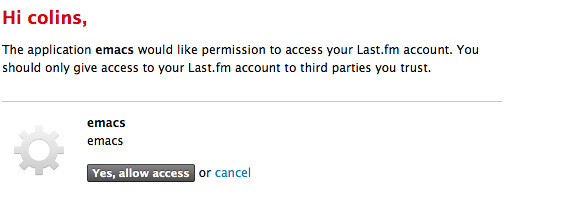Presenting elfm.el
2012-04-28
elfm.el is a rudimentary last.fm radio client implemented within emacs lisp. I wrote this at work to present at our internal "Radio Hackday"; dedicated to encouraging staff to experiment with the radio services and API , and make something with them in a day and a half for show-and-tell. Kind of 20% time distilled right down to an essence.
I wasn't sure if I was going to have enough time to contribute anything, so I wanted to focus on something I could hack on by myself, because I didn't want to hold a team back if I got called away. So I picked something jokey, inessential, yet hopefully thought-provoking, as per my usual idiom.
I had a real blast participating. I don't usually get time to attend things like proper hack days, being all old and family-bound. I really enjoyed the atmosphere of inspiration and industry. All the other hacks were amazing, and waiting for my turn to demo I felt quite embarrassed about my stupid cryptic toy, but it worked perfectly in the spotlight. I got almost all the laughs, and all of the bemusement I was aiming for.
The code is here . It is awful. I haven't written any coherent lisp on this scale for many years. It uses too many global variables and special buffers. It doesn't scrobble. I had to rewrite all my planned asychronous network event machine halfway through implementation, when I re-discovered the lack of lexical closures in elisp. ( I've been reading too many common lisp books in the interim, I suspect ). I think there's enough of the germ of a useful idea in there that I might just clean it up and try and extend it into a proper thing.
I built and run it using GNU Emacs 23.4.1 . I used an external library for HTTP POST , which I found on emacswiki ( HTTP GET I glued together using the built in URL libraries). I've also put a copy of the version I used in the distribution directory. I used mpg123 for mp3 playback, which I installed using Mac Ports . The path to mpg123 is hardcoded in the lisp somewhere, probably inside play-playlist-mpg123.
Here's my demo script, which I evaluated in a scratch buffer. Evaluating these forms in sequence will authorise the application, tune in the radio, and then fetch a playlist of five tracks and start playing them.
;;;; -----DEMO , this example code is out of date, see README
; will open a browser to authorise application
(authenticate-app)
; authenticate a user session
(start-user-session)
; tune the radio to this URL
(radio-tune "lastfm://user/colins/library/")
; refresh the playlist
(get-request (get-playlist-url))
; filter the playlist response to sexps, play the list
(play-playlist-mpg123 (reduce-playlist))
There is only one playback control at the moment; stop, which you can manage by killing the buffer lastfm-radio which has the playback process attached to it. You can retune the radio with any lastfm:// URL format , by re-evaluating radio-tune, and then refreshing and playing the playlist i.e. repeating the last three steps in sequence.
The internal hackday was a cracking idea. Most of the hacks were focused around radio enhancements with broad-ranging appeal, the vast majority of them looked practically useful. I suspect most of the work will filter out into site and product updates. In addition to this, and perhaps more valuably, it worked really well as a community exercise, evolving knowledge-sharing, cross-team working, and enthusiasm, and converting them into inspiration, craft, and art. More of this sort of thing, everywhere!
Updated
I've iterated on the original hack quite a lot to make it slightly less brain-damaged, and a bit cleaner to import into anyone else's emacs. Updated code is here and so is a README file with updated running instructions. It's still not really in a usable state for anyone else, but it's amusing me to fiddle with it, and I vaguely plan to get it to a releasable alpha state, at which point I will publish a repository.
